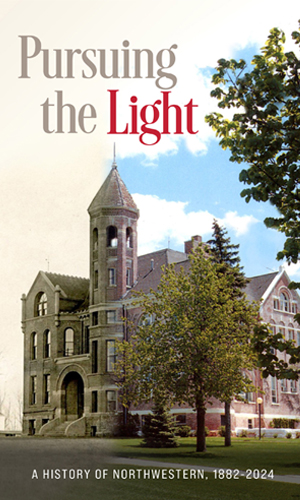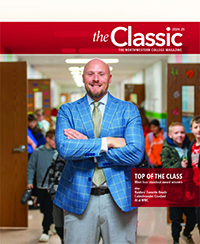Northwestern College publishes history book
Wednesday, September 17, 2025
A new book, “Pursuing the Light: A History of Northwestern, 1882–2024,” tells the story of the institution’s growth from a classical academy and junior college into a college that enrolls about 1,700 undergraduate and graduate students and has more than 16,300 alumni around the world. The primary author—Dr. Douglas Firth Anderson, professor emeritus of history and Northwestern College’s part-time reference librarian and archivist—spent more than eight years researching and writing the volume.

“Doug pored over thousands of pages, including board of trustees minutes and every issue of the student newspaper and alumni magazine,” says Greta Grond, director of Northwestern’s DeWitt Library and a member of the book’s planning team. “Beyond his gifts as a researcher, Doug is an exceptional writer. I was confident he would draw out themes that speak meaningfully to readers. As a historian, he excels at situating Northwestern’s story within the broader sweep of regional and American history, allowing the past to be understood in a fuller context.”
“Pursuing the Light” will be available for purchase at the Northwestern College Bookstore in the Rowenhorst Student Center, and online at https://bookstore.nwciowa.edu, beginning Oct. 1 for $25. Books can also be purchased at an open house reception as part of Raider Nation Celebration Saturday, Oct. 4, at 10:30 a.m. on the main floor of DeWitt Learning Commons. A brief program at 11 will feature readings from the book. A similar event at 6:30 p.m. on Tuesday, Oct. 7, at Orange City’s Dutch American Heritage Museum, will feature readings and a panel discussion about the book’s creation.
The nearly 400-page book features nine chapters presenting Northwestern’s history chronologically, as well as seven chapters on athletics, more than 125 photos from the archives, and 40 sidebar articles on people and topics important to the institution. “Pursuing the Light” also includes extensive appendices, such as enrollment figures and lists of campus buildings over the years, principals and presidents, chaplains/pastors, head coaches and Athletic Hall of Fame inductees.
The book’s title is a nod to Northwestern’s longtime motto, “Deus est lux (God is light),” which is inscribed on the cornerstone of Zwemer Hall. “Hopefully readers will see that God has been at work at Northwestern,” says Anderson, “and that we’re seeking God’s light. We don’t claim to have always found it, but we are pursuing it.”
Anderson primarily used written sources, with a strong emphasis on student voices, to tell Northwestern’s history. “Additionally, I tried to be aware of larger context,” he says. “Who was here before there was a Northwestern? What developments in higher education, in the region, nation or internationally, and what about American religion might need noting and explaining in order to better understand what did and did not happen at Northwestern?”
In addition to Anderson and Grond, other members of the planning team were Jill Haarsma, executive assistant to the president, who served as managing editor, and Kim Van Es, longtime English instructor, who served as content and copy editor. Duane Beeson, director of marketing and communications, wrote the athletics sections and several sidebar articles. Other sidebar contributors include Grond; Haarsma; Van Es; Carrie Odell Anderson, alumni network assistant; Sara Huyser, outreach and engagement librarian; Dr. Rebecca Koerselman, associate professor of history education; and Emelie Laackmann, assistant director of marketing and communications.
Dr. Anderson, the primary author, is an expert on the history of the American West and American religious history. A member of the State Historical Society of Iowa’s board of trustees, he formerly served as president of the Conference on Faith and History. He is co-author of a photographic book about the history of Orange City, Iowa, and of “Pilgrim Progression: The Protestant Experience in California.” The recipient of Northwestern’s 2014 Faculty Inspirational Service Award, Anderson earned a doctorate from the Graduate Theological Union in Berkeley, California.

